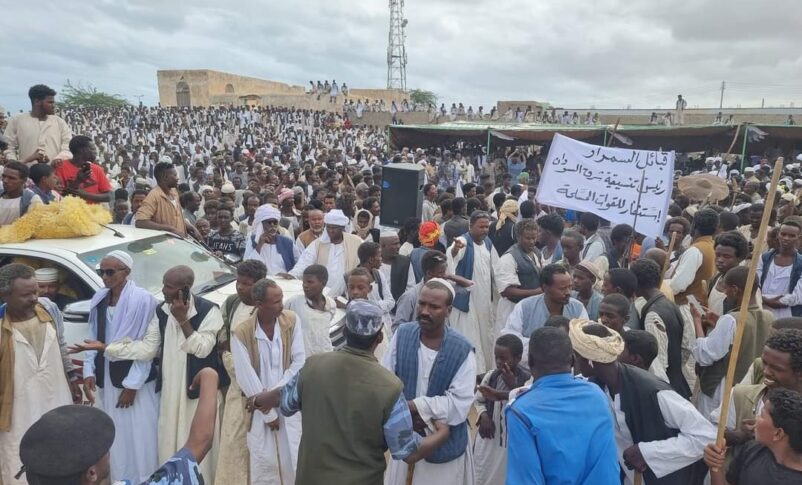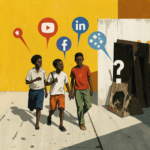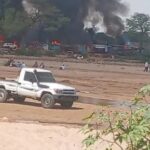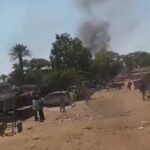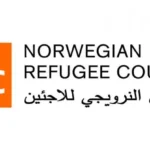Darfur Follow-ups: Khartoum
Cases of popular alert and arming are increasing in Sudan to confront the expansion of the Rapid Support Forces in large areas outside the capital, Khartoum, which raises the fear that the conflict between the army and the Rapid Support Forces will turn into a civil war.
There are increasing calls in the northern states for mobilization and support of the armed forces, and civil entities in the east of the country announced their readiness to confront the Rapid Support in cooperation with the army, while large crowds from the Kawahla tribe in the White Nile State came out on Monday, declaring their readiness to confront the Rapid Support Forces.
On Monday, the original Democratic Unionist Party reaffirmed its supportive position in support of the Sudanese Armed Forces in what it called the Battle of Dignity, urging its support and backing.
He appealed in a statement to “all its members, the members of the Sufi orders, and the native administrations that have supported the party throughout history, to be at the forefront of volunteers to respond to the call to defend the homeland and to protect civilians.” Volunteers should only be active in defense, each within his jurisdiction.”
The Forces of Freedom and Change and civil society organizations accuse elements of the former regime and its loyalists of being behind the campaign and calling for turning the war into tribal confrontations.
A member of the Central Council for Freedom and Change, Alaeddeen Nogod, told Sudan Tribune that there is an organized and strong campaign for arming and mobilizing currently underway.
He stated that there is a new player in the Sudan war, which is the global Muslim Brotherhood organization and its leadership of organized campaigns to mobilize and arm Sudanese civil society.
He stated that this campaign is being led by the organization from Türkiye, Gulf and European countries on social media.
Nogod noted that this campaign calls for the mobilization and arming of the Sudanese, especially in the north and east, saying: “They must miss this opportunity.”
At the same time, he saw that the three stages that the former regime laid out for the war in order to return to power all failed, starting with resolving the war in hours and days, the second stage was the destruction of infrastructure, and the third stage was a state of neither peace nor war.
He added: “All of these stages failed, and they have now turned to the fourth stage, which is the civil war through mobilization, arming, and arming.”
Nogod acknowledged the existence of violations, but stressed that the campaign had other goals because it contained a very strong ethnic, tribal, and regional tendency that was consistent with what was happening in the media and on the ground.
Intense discussions are taking place on social media between advocates of stopping the war and those demanding that people be armed in the various states to confront the Rapid Support Forces.
Political parties in many states are leading organized campaigns to push officials in those states to arm citizens under the pretext of protecting their areas against Rapid Support attacks.
On Tuesday, volunteers accused the Rapid Support Forces of seizing a large number of villages in the north and west of Sinnar State after its members incursions into Jazeera State.
Since the Rapid Support Forces extended their control over the entire state of Al-Jazeera, they expanded to belong to the adjacent state of Sinnar, where they clashed with the army at the Sinnar sugar factory located west of the city, while the army’s warplanes bombed the movements of the Rapid Support Forces on the border with the state of Al-Jazeera.
A statement issued by the Sinnar Youth Gathering, a volunteer group active in providing support for those fleeing the military conflict, said: “The Rapid Support Forces invaded many villages located in the west of Sennar, the northwest of the city of Sinnar, and the south of Jazeera State.”
He noted that it stormed homes, looted citizens’ property, and caused terror and fear. He pointed out that the villages whose residents were looted are Shekh Hajo and Fares Buildings, and some towns are being counted.
The statement spoke about the exchange of artillery shelling between the army and the Rapid Support Forces in a number of villages west of Sinnar, which caused a number of civilian casualties.
Sinnar, which hosted large numbers of people fleeing the Jazeera State, is witnessing a state of panic and fear after the conflict spread to the Jazeera State, which led to the closure of markets and some hospitals, while a large number of citizens left the city.
Looting and abuse
The Governor of the River Nile State, Mohamed al-Badawi, said in front of thousands of citizens of the city of Shendi last Sunday that they would train young people to carry weapons, and the Artillery Commander, Major General Mohamed al-Amin, pledged that he would open weapons stores to distribute them to volunteers.
In a meeting in the coastal city of Suakin, the Governor of the Red Sea State, Mustafa Mohamed Nour, announced the inauguration of the “armed popular resistance” on Monday, and stressed the readiness of the citizens of his state to defend their region.
For his part, the leader of the Beja tribes in eastern Sudan, Mohamed Al-Amin Turk, said in front of thousands of tribesmen that the time for negotiations with the Rapid Support has ended, and that they are ready to take up arms to defeat “the rebellion, and the east will be their graveyard if they try to attack it,” as he put it.
Social media sites, where some young people are active in areas that were “conquered” by the Rapid Support Forces, reflected accounts of “widespread violations in dozens of villages in the state of Al-Jazeera, the looting of citizens’ property, including cars, gold, and money, and the killing of those who defended their property and their families.” These sites also talked about “Children were kidnapped, and a ransom was demanded in exchange for their release.”
For his part, Osman Abdullah from the Um Dagarsi area said that these forces “abused young men and children, and flogged them in front of their parents to force them to hand over the keys of their cars, their women’s jewelry, and their money, which led to the citizens of the area carrying firearms and white weapons, and they were able to kill 7 members of the Rapid Support Forces who in turn killed 5 of them.”
Ismail Al-Taher from the “Arbaji” area also stated that the forces stormed it last Sunday, “plundered their cars and homes, and shot some citizens, and that they called for help from its commander, Abu Agla Kekal, in Wad Madani, who came to them and apologized for the practices of his forces and pledged to hold them accountable.”
Al-Tahir adds that dozens of members of the Rapid Support Forces returned on Monday and “carried out retaliatory operations, arrested citizens, tortured others, and interrogated them because a complaint had been filed with Kickel against them, and the gunmen looted other belongings and cars.”
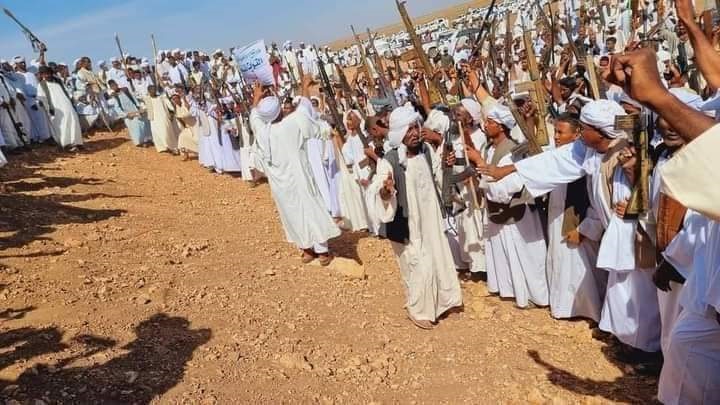
Confession and warning
For his part, the head of the Rapid Support Department of Thought and Culture, Hafez al-Zein, who is in Wad Madani, said that the second commander of these forces, Abdul Rahim Dagalo, ordered the imposition of severe punishments on those escaping from his forces who attack citizens and their rights.
He explained that the “Committee for Combating Negative Phenomena” in the Rapid Support allocated 100 combat vehicles to pursue these people, and recovered from them 10 trucks and 100 cars that were looted from the “Fadassi” area and handed them over to their owners. 100 of their members who attacked citizens and looted their property were arrested, and 400 of them were arrested. the thieves.
Regarding the “armed popular resistance”, the Rapid Support Forces condemned – in a statement last Sunday – what it described as “arming civilians” by Sudanese Army Intelligence.
added that supporters of deposed President Omar al-Bashir in the Civil Congress Party are seeking to arm civilians “with the aim of dismantling the country and dividing it again. Our forces will not allow this plan to be implemented.”
In this context, the Sudanese Congress Party, which is active in the “Forces of Freedom and Change Alliance,” condemned what it described as “grave violations committed by the Rapid Support Forces against civilians in Al-Jazira State,” holding them fully responsible, and demanding that they immediately stop engaging in them.
The party stressed its categorical rejection of pushing citizens to engage in war through increased military mobilization, and believed that this would contribute to prolonging the conflict, lead to the possibility of it turning into a civil war, and open the door to comprehensive chaos and the danger of division.
The head of the Sovereignty Council, Abdel Fattah Al-Burhan, implicitly accused the “Forces of Freedom and Change Alliance” of being “a political arm of the Rapid Support.”
Legitimate concerns
For his part, political researcher Montaser Abdullah believes that the popular resistance began since the first months of the war last June in West Darfur state, when hundreds of young men from the “Masalit” tribe took up arms after accusing the Rapid Support Forces and a militia allied with them of killing thousands of people. The tribe in “crimes” that human rights organizations considered “genocide.”
In his speech, the researcher explains that the Hamar tribe in West Kordofan state armed 5,000 of its youth last July, and prevented the support forces from attacking the city of Al-Nohood, the tribe’s stronghold, and their other villages and areas.
Abdullah attributes the reason why citizens carry weapons to their conviction that their armed forces, after 8 months of war, “are unable to achieve a decisive victory over rapid support, and were unable to protect them from violations, killing, and the plundering of their money and property.”
Abdullah warns that the spread of weapons without controls will have serious repercussions in the future, and he called on the army to use volunteers and reserve soldiers because they are more trained and qualified to use weapons, and it can be collected from them after the war stops.
He asserts that “in light of polarization and the spread of hate speech, carrying weapons without strict controls could push the country into civil war.”
Sudanese youth refuse to meet Hemedti and Al-Burhan and demand to be armed
The head of mobilization and in the Sudan Youth Bloc, Ismail Ahmed, announced their support for the Sudanese Armed Forces in their war against the Rapid Support Forces, and confirmed their initiation of mobilization and mobilization in order to defeat the rebellion and protect Sudan from any colonialists.
He said in his address to the inauguration of the Popular Resistance Declaration in the city of Suakin in the Red Sea State that they are behind the Commander-in-Chief of the Armed Forces and his military leaders and we tell them to move forward and we are with you and we want to work to arm every young man in Sudan to protect the homeland and the supply of rapid support.
He continued by saying (Do not deprive the youth of defending Homeland and martyrdom in order to defend religion and homeland.
He expressed his admiration for the patriotism and courage of mayor Turk through his strong positions towards the homeland, and that the declaration of popular resistance to defend national sovereignty is the best evidence of the strength and courage of this man, who deserves the Order of the Nilein, first class, as soon as the rebellion is resolved, God willing, and he praised the ability and skills of the Sudanese Armed Forces in against the international and regional conspiracy. Which is being plotted against Sudan.
He announced their rejection, as youth, of the upcoming meeting between Hemedti and Al-Burhan, stressing that the time is not appropriate for this meeting in light of the displacement, looting, and theft of the property of defenseless citizens. The rebellion must be ended first, Sudan must be liberated from rapid support, and then thinking about negotiation.
The Beja Congress refuses to mobilize
The Beja Conference appealed to the citizens of eastern Sudan to reject and boycott the mobilization and campaigns, and accused those it described as symbols of the former regime of calling for them with the aim of igniting the flames of war.
It considered that they constitute a threat to the security of the eastern Sudan region, and considered that these calls to take up arms give justifications for extending the war to the east.
He called on the international and regional community to put more pressure on both sides of the conflict in order to immediately stop the war and address the critical humanitarian situation.
He also called for real societal reconciliations that include all components of eastern Sudan in order to achieve stability in the region.
The leadership office directed its members to exert more effort and support all activities through the party’s political alliances represented by the Revolutionary Front, Freedom and Change, and the Coordination of Civil Democratic Forces (Tagadom), seeking to stop the war and restore democratic transformation.
It also directed to contact and network with organizations working in the field of international and societal peace.
Last June, Al-Burhan announced general mobilization and alert, and called on young people who are able to carry weapons to go to the nearest military unit.
The number of citizens who trained in the states during the past months was estimated at more than 400,000, but the number of those who participated in fighting alongside the army is limited.

